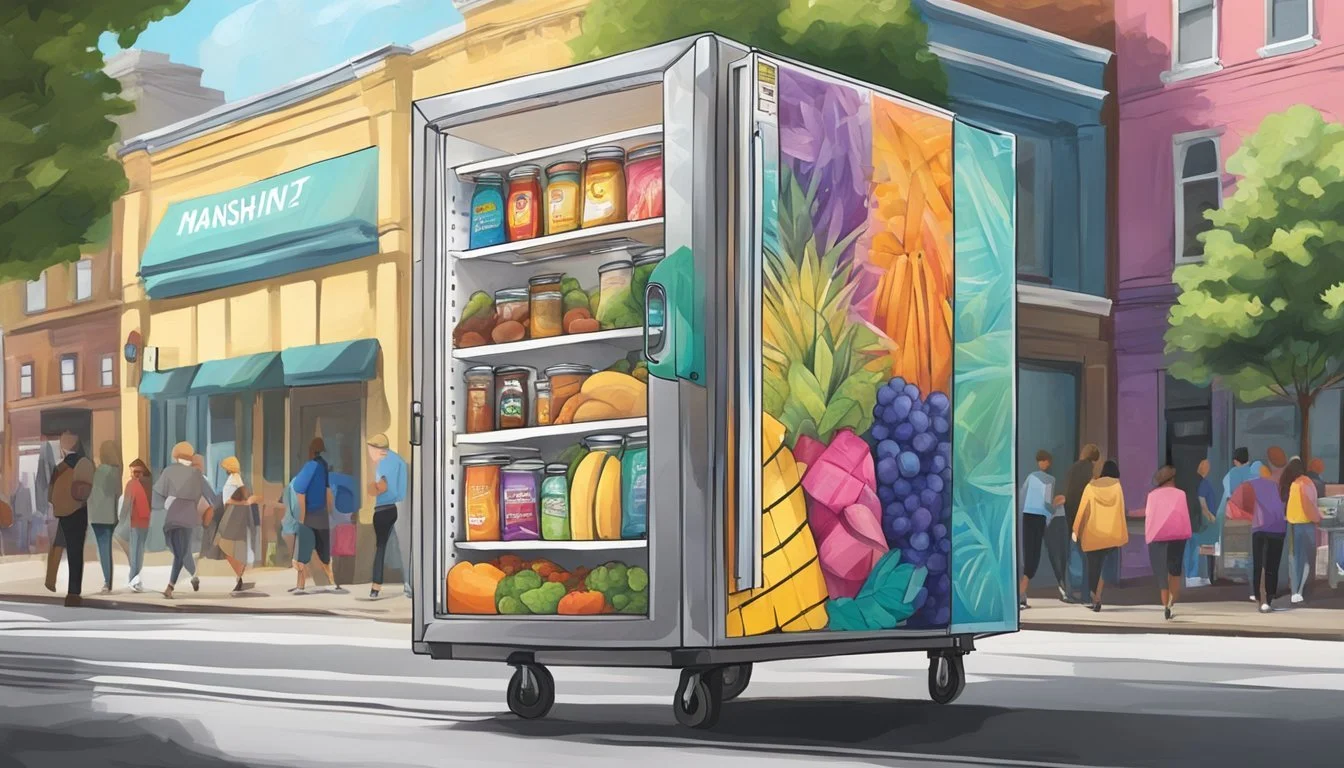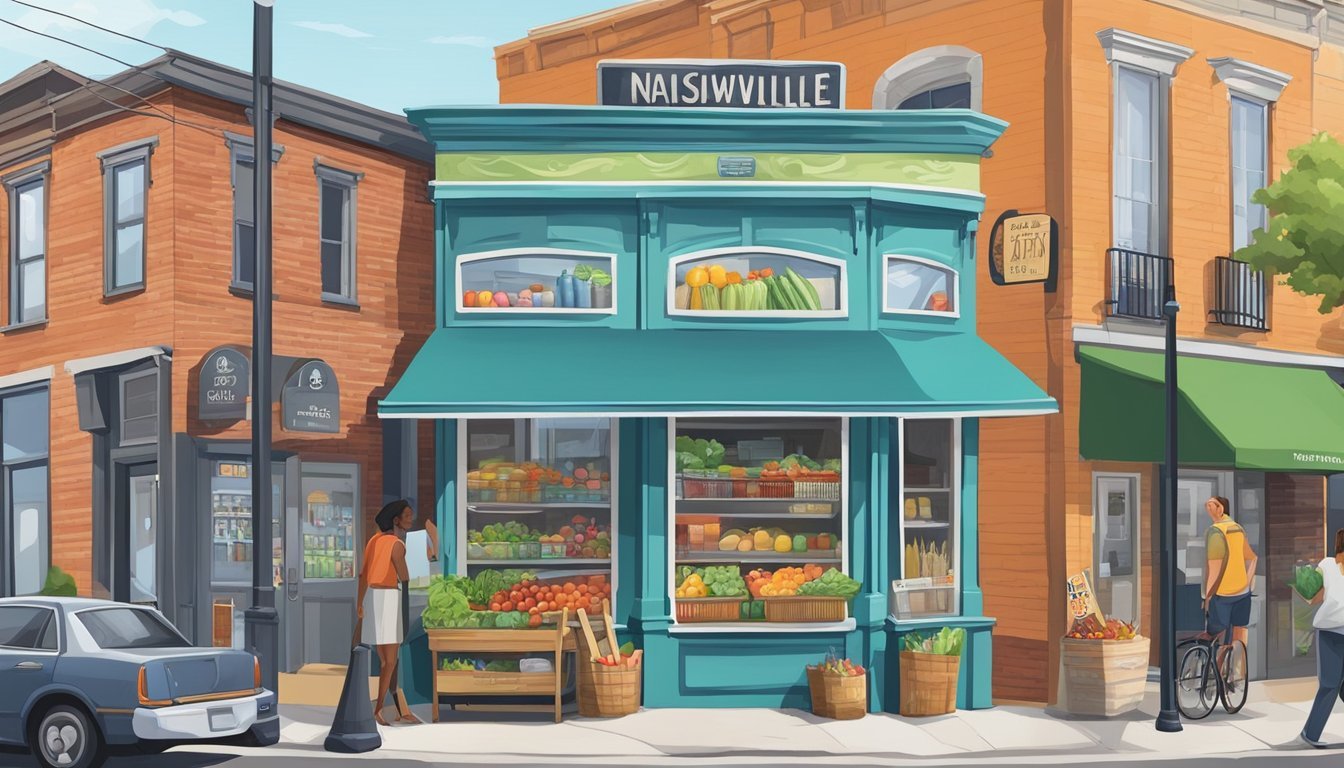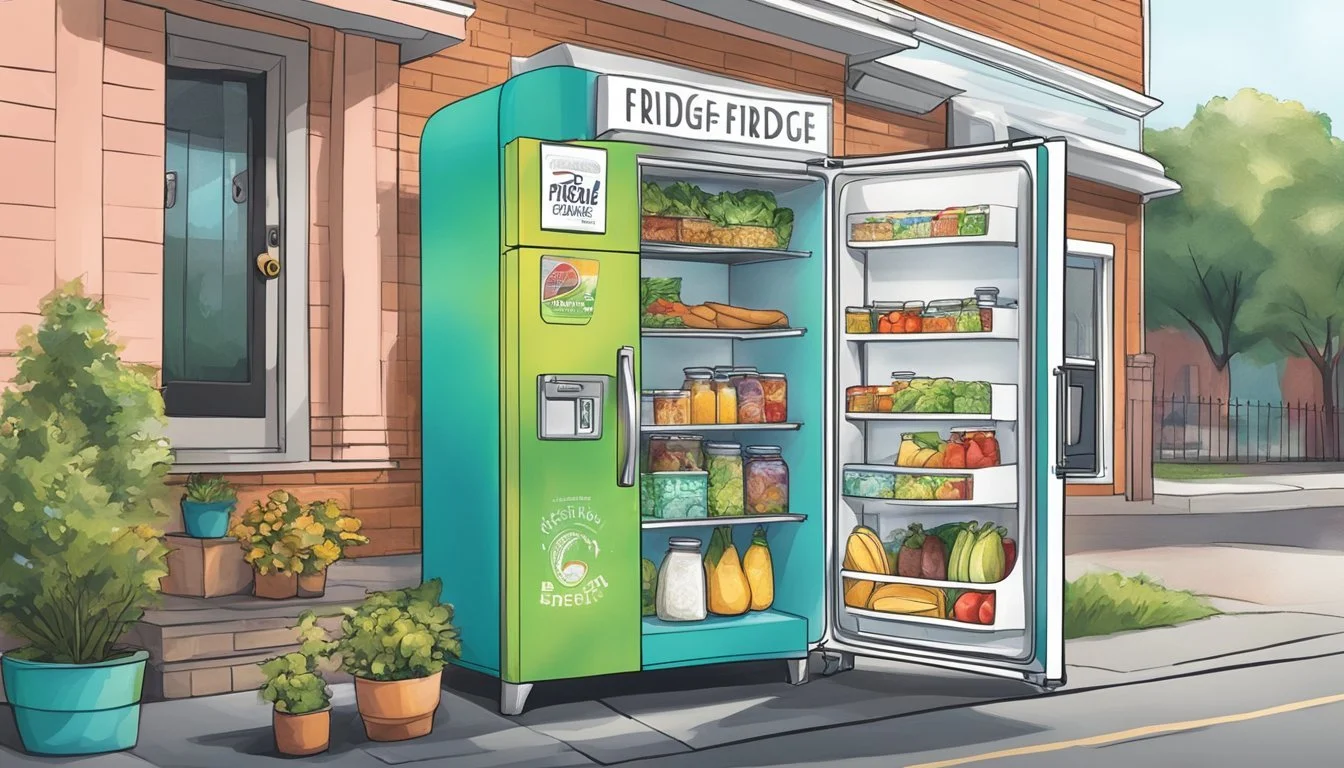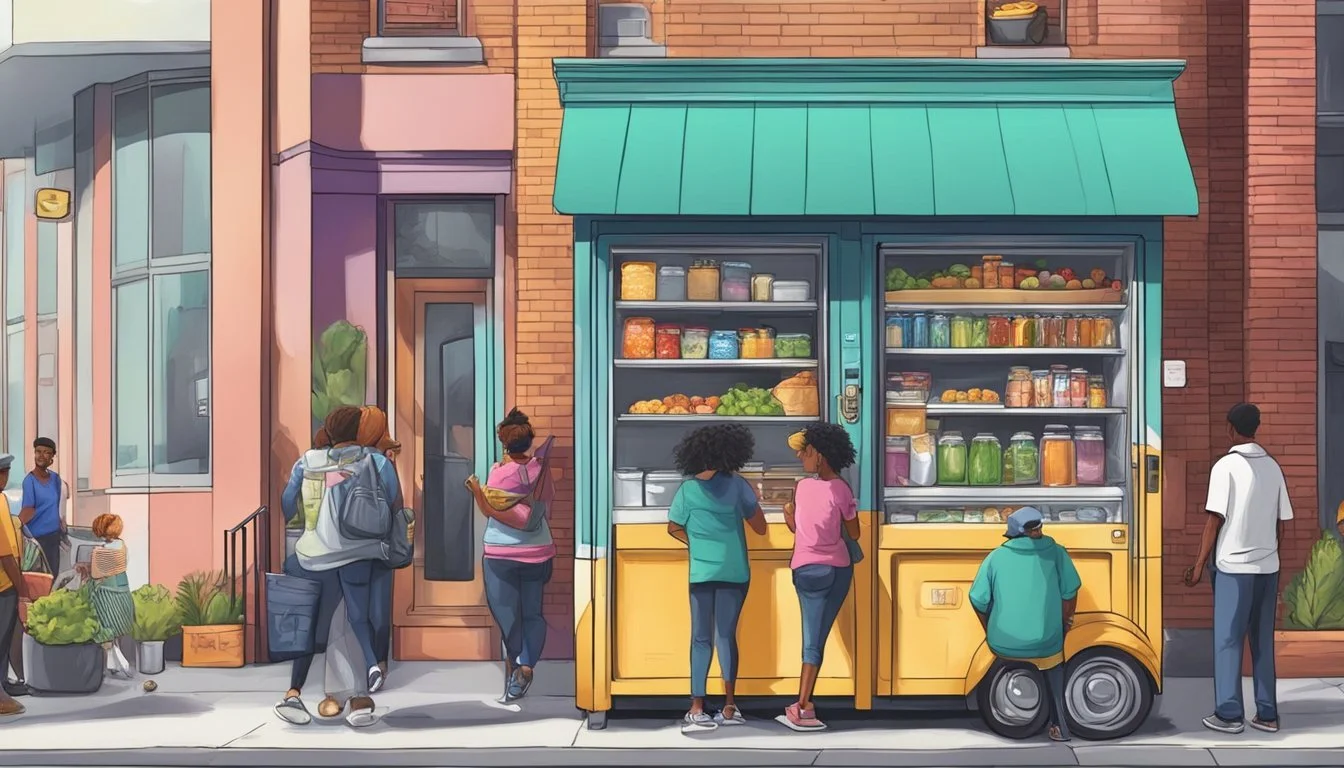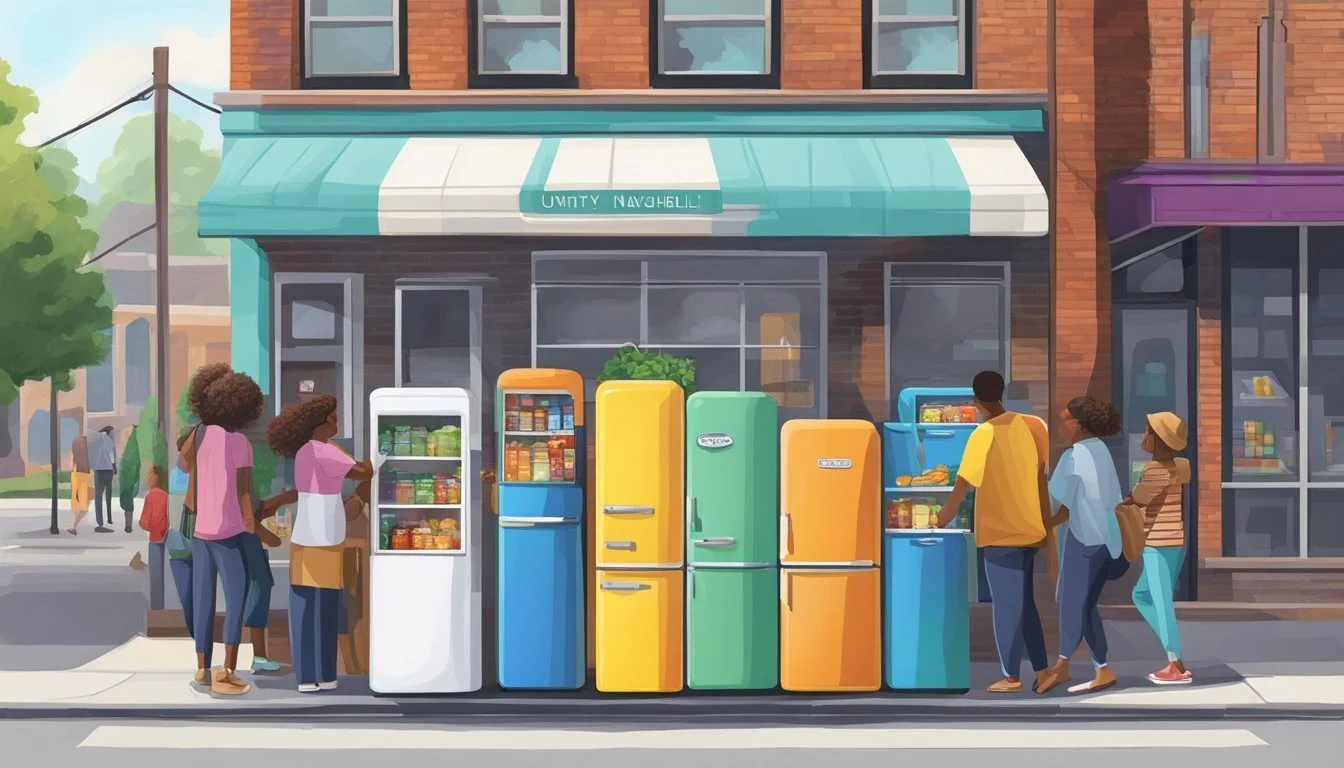Nashville, TN Community Fridge
Bridging the Gap with Food Sharing Initiatives
Nashville, Tennessee, is addressing food insecurity in its communities through an innovative solution known as the Community Fridge. This initiative provides a source of free, accessible food to anyone in need, embracing the concept of mutual aid and community support. The fridge operates on a simple principle: take what you need, leave what you can. It not only offers food relief but also fosters a spirit of sharing and community resilience.
The Nashville Community Fridge is a brightly painted beacon of hope that stands under a shelter outside North Nashville art venue, Elephant Gallery. Local businesses, individuals, and volunteers support it by donating food, ensuring the fridge is always stocked. This community-led program works to bridge the gap for those facing food insecurity, making essential food items available without barriers—a testament to Nashville's commitment to nurturing its residents.
By cutting down on wasted surplus food and connecting people to nutritious options, the Community Fridge serves as a tool for both social and environmental wellness. It supports the ethos that access to food is a right, not a privilege. The initiative encourages community involvement and serves as a model for how local actions can make a significant impact on broader societal issues.
What Is a Community Fridge?
Community fridges serve as a novel approach to combatting food insecurity. They are managed by volunteers and embody the spirit of sharing and mutual aid within local communities.
Concept and Mission
The core idea of the community fridge is to provide a shared space where residents have access to free food, especially for those facing food scarcity. Volunteers play a crucial role in the maintenance and stocking of the fridges. The mission is rooted in mutual aid and community solidarity, aiming to offer immediate help by defying the conventional models of food assistance.
Benefits for the Nashville, TN Community
In Nashville, TN, the presence of a community fridge has numerous benefits. It:
Reduces Food Insecurity: Directly addresses food scarcity issues by making food available to those in need without any barriers to access.
Encourages Food Sharing: Allows residents to contribute excess food, thus reducing waste.
Fosters Community: Actively involves locals in aiding their neighbors, creating a stronger sense of community.
The History of Nashville's Community Fridge Movement
The Nashville Community Fridge Movement began as a grassroots initiative aimed at addressing food insecurity and has since expanded, particularly during the pandemic, to become a cornerstone of mutual aid within Nashville, TN.
Origins and Growth
The Nashville Community Fridge project was conceived as a direct response to the growing need for food accessibility in the city. A simple concept where a fridge is stocked with food items, the movement began with modest efforts outside of local venues like the Elephant Gallery at 1411 Buchanan St. The brightly painted community fridge started as a symbol of mutual aid, where neighbors could leave or take food items, operating on a no-questions-asked basis. The fridge quickly became a fixed point for community sharing.
As the initiative gained traction, more fridges were launched across the city. Volunteers have played a pivotal role, managing social media accounts such as Instagram to raise awareness and organize stocking and maintenance efforts. The project's growth is a testament to Nashville's commitment to community sustenance and solidarity.
Impact of the Pandemic
When the pandemic struck, it amplified existing food security challenges and economic disparities in Nashville, TN. The community fridges became even more crucial as a lifeline for those affected by the pandemic-related job losses and supply disruptions. This period saw an increase in community involvement, with people donating perishable goods and staples to the fridges.
Organizations like the Richland Park Farmers Market collaborated with The Nashville Food Project, ensuring a continuous supply of fresh and local food all year long. Online platforms, particularly Facebook groups, boosted the initiative, fostering a spirit of community support and highlighting the pandemic as a catalyst that brought out the best in Nashville residents — their generosity and resilience in the face of crisis.
Locations and Accessibility
Nashville, TN, has embraced the community fridge initiative to combat food insecurity, with key locations in North and East Nashville. These fridges offer free food and are accessible to the public around the clock, embodying a spirit of mutual aid and community support.
North Nashville Initiative
In North Nashville, a community fridge operates outside the Elephant Gallery at 1411 Buchanan St. This fridge, known for its beautiful artwork, is an open resource where individuals are free to take what they need or contribute food items. Open 24/7, this fridge ensures that residents have access to food outside of traditional business hours, addressing urgent needs irrespective of time.
Expansion to East Nashville
The commitment to food security is expanding to East Nashville with services like food pantries and community fridges. The Help Center, located at 213 W. Maplewood Ln, Suite 400, Nashville, TN 37207, offers a food pantry available from Monday through Wednesday, 9:30am to 3:30pm. Additionally, Inglewood Church of the Nazarene, situated at 3936 Gallatin Pk, Nashville, TN 37216, provides another notable location joining the cause in East Nashville.
How to Contribute
Contributing to the Nashville Community Fridge is straightforward and impactful. Everyone is welcome to assist either by donating food or offering volunteer support to maintain the initiative.
Donation Guidelines
To donate food to the Nashville Community Fridge, individuals should ensure all contributions are safe and align with the set guidelines. Non-perishable items and fresh produce are preferred. However, raw meat is discouraged due to safety concerns. All donations must adhere to the honor system, guaranteeing that items are in good condition and safe for consumption.
Preferred Donations:
Fresh fruits and vegetables
Packaged non-perishables
Sealed beverages
Items to Avoid:
Raw meat
Expired products
Opened or partially consumed items
Volunteering and Support
Volunteers play a vital role in the success of the Nashville Community Fridge by ensuring the food is stocked, and the space is clean. Those interested in volunteering can reach out to local businesses that host the fridges or directly contact the organizers. Businesses are instrumental in the project, offering public spaces for the fridges, which enhances community involvement and accessibility.
Volunteer Tasks:
Monitoring the cleanliness of the fridges
Sorting donations
Coordinating with businesses for placement and maintenance
Volunteering and support can also come in other forms, such as financial contributions or providing essential services like transportation or refrigeration maintenance.
Operating a Community Fridge
The successful operation of a community fridge in Nashville, TN hinges on consistent maintenance and safety protocols, as well as establishing solid partnerships with local entities.
Maintenance and Safety
The refrigerator must undergo regular cleaning and maintenance to ensure it remains a safe and hygienic resource for the community. Rules for use are posted prominently to guide community members on how to properly utilize the fridge. Here's a brief overview of the upkeep this initiative requires:
Cleaning Schedule:
Daily: Quick checks for expired or spoiled food items.
Weekly: Comprehensive cleaning of the interior and exterior.
Only fresh and properly packaged food allowed.
No raw meat or seafood to prevent cross-contamination.
Partnerships with Local Businesses
Local businesses are critical to the sustainability of the community fridge. These partnerships involve businesses donating surplus food or funds to help manage the costs associated with running the refrigerator.
Food Donations:
Businesses provide perishable and non-perishable items.
All items are checked to meet health standards before being placed in the fridge.
Financial Support:
Monetary contributions assist with repair and operational costs.
Businesses may also contribute through sponsorship or providing services at reduced rates or pro bono.
Maintaining a community fridge necessitates regular attention to detail and the support of local businesses, alongside community members adhering to established guidelines to ensure it serves as a reliable food source for those in need.
Community Outreach and Education
The Nashville Community Fridge initiative emphasizes on enlightening the local population and providing skills to combat food insecurity through collective efforts.
Events and Workshops
Nashville's approach to addressing food scarcity includes organizing events and workshops around its community fridges. These events serve as a platform for volunteers and community members to learn about food donation safety, fridge maintenance, and the importance of mutual aid. Workshops facilitate knowledge sharing on sustainable practices and equip attendees with the skills to replicate the community fridge model in different neighborhoods.
Social Media Engagement
The initiative utilizes Instagram as a vital tool for education and engagement. Spearheaded by activists like Emily Lawlor, the social media strategy aims to raise awareness about the locations of community fridges, share updates on stocking and cleaning schedules, and celebrate community involvement. Regular posts feature success stories, highlight the need for donations, and provide a call to action for community participation.
By conducting workshops and maintaining active social media communication, Nashville's community fridge organizers foster a well-informed public ready to tackle food insecurity together.
Understanding Food Insecurity
Food insecurity occurs when individuals lack reliable access to sufficient, nutritious, and affordable food. It affects communities by increasing the risk of hunger and nutritional deficits. In Nashville, TN, as in many cities, this challenge is multifaceted, impacting a diverse cross-section of residents.
Prevalence: It's estimated that food insecurity touches one in eight people, disrupting their ability to lead healthy, active lifestyles. Factors contributing to this include income inequality, unemployment, and rising living costs.
Impact of Nutrition: Lack of nutritious food can lead to health problems such as stunted development in children, and chronic illnesses in adults. Food insecurity often compels families to purchase cheaper, less nutritious options due to monetary constraints.
Community Response: Initiatives like the Nashville Community Fridge offer one innovative solution. By providing a space for donated food that is free and accessible, they directly address the gap in food access. Residents can both contribute to and benefit from a shared resource that prioritizes dignity and community support.
Effects on Hunger:
Persistent hunger: can result from prolonged food insecurity, leading to malnourishment.
Emergency food assistance: may be sought more frequently by those facing consistent food shortages.
The phenomenon of food deserts, or areas with limited availability of healthy food options, further exacerbates food insecurity. In response, community fridges act not only as food sources but also raise awareness, encouraging broader societal engagement in addressing this pressing issue.
Key Figures and Organizations
The Nashville Community Fridge project is a testament to local initiative and organizational support. This section uncovers the pivotal roles played by local champions and supportive institutions in the fruition and sustenance of the project.
Local Champions
In every community-oriented initiative, there are individuals who stand out for their dedication and effort. These local champions are the driving force behind the day-to-day operations and ongoing success of the Nashville Community Fridge. Local artists contribute to the unique aesthetic of the fridges, transforming them into neighborhood landmarks. Additionally, volunteers play a critical role, maintaining cleanliness and ensuring the fridge is stocked with food.
Supportive Institutions
The success of the communal fridge is also thanks to the collaborative effort of various supportive institutions. Businesses contribute by providing resources, either through direct funding or by supplying food. The involvement of non-profit organizations fortifies the community fridge initiative with structured support and increased outreach. Additionally, institutions like Vanderbilt are significant in the wider support network, contributing to the initiative with expertise, volunteer staff, and resources. Drkmttr Collective, an all-ages music and arts venue, has been vital in championing the cause by not only endorsing it but also likely providing a space for community engagement.
Future Prospects
The Nashville Community Fridge initiative is poised for growth and continued impact, with strategies in place for expansion and a focus on sustaining its efforts in the long term.
Expansion Plans
The initiative is actively exploring new locations throughout Nashville to install additional community fridges. By collaborating with local businesses and organizations, the aim is to increase accessibility to free, nutritious food for those facing food insecurity. Target areas are selected based on community need and the potential for local partnerships that ensure ongoing support and provisioning.
Sustaining the Movement
Sustainability of the community fridges rests on continued community engagement and mutual aid. The movement relies on:
Volunteer support: A strong volunteer network ensures fridges are regularly cleaned, maintained, and restocked.
Donation drives: Regular donation drives to secure a consistent supply of perishables and essential non-food items.
Awareness campaigns: Efforts to raise awareness and foster community involvement are crucial for the initiative's longevity.
By adhering to these strategies, the Nashville Community Fridge aims to maintain momentum, encouraging other communities to adopt the model and thus expanding the beneficial impact of community fridges.

